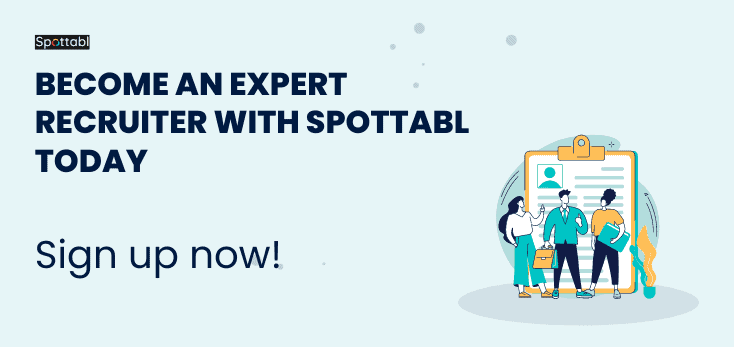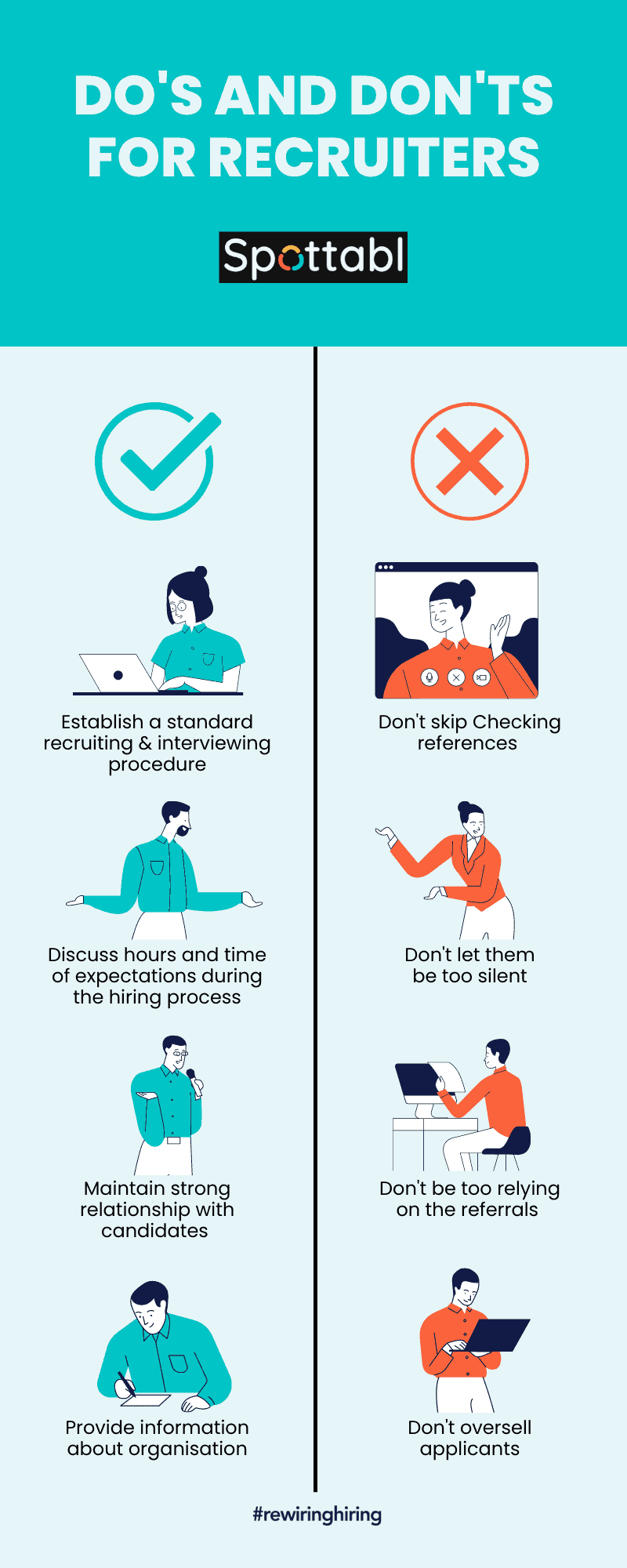It’s an utmost important task for a recruiter to make every hire, every call, and every conversation with a candidate COUNT.
It is crucial to know the dos and don’ts because interviewing candidates is an important task – not just in terms of hiring the best candidates but also in terms of the way you represent your company. The interview is an employer’s opportunity to learn more about a job candidate than can be found on a résumé or in a job application. But it also lays the foundation for what the potential employee can expect from the company.
It’s also an opportunity for the candidate to learn more about the company and the position in order to assist them to decide whether or not to accept the job offer if one is offered. As a result, particularly if you’re new to the recruiting process, it’s critical that you prepare for an interview.
While an interview does not have to be a formal sit-down, it does have different elements, each of which is critical. The purpose of executive recruitment is to find the best candidate for a job opportunity and the recruiter’s job is to ensure the cycle is completed when the candidate accepts the offer.

However, we all know that even the finest hiring manager or recruiter may be led astray by the process. Sometimes the individual who impressed you during the interview turns out to be a poor hire – and this happens without any warning indications.
Improper hiring costs a lot of money. When you include hiring costs, training costs, the remuneration for the failed employee, and finally any severance money, the statistics may be startling. These figures don’t account for intangibles like disturbance among other employees who are taking up the slack, the risk of losing good employees’ loyalty, and the expenses of blunders and missed chances.
The Role Of The Interviewer
As the interviewer, you must provide the following information to the applicant:
- Nature of the job
- Company’s goals and values
- The skills you want
- Pay, although some interviewers do not discuss compensation until after a job offer has been made
- Benefits & perks of the role
- Working conditions
These days, candidates are more knowledgeable, and the majority of them will have some questions for you. When it comes to high-quality prospects, the employer may have to market his or her company as a place to work.
You must provide information to candidates that maintain their interest in working for you strongly. Overselling, on the other hand, might result in employee unhappiness, costly attrition, or worse.

Do’s for Recruiters
- Maintain strong relationships with candidates
Listen carefully to what the candidates have to say. When you and someone else share the same passion, you can quickly form a bond that you may not have had before.
Communication is important because if you ignore phone calls or emails, whatever relationship you’ve developed and maintained can swiftly erode.
- Analyse The Candidate’s Resume
As we go into the digital era, paper and pencil are being replaced by computers or iPads, resume printing is becoming “demodè,” and we all find it more trendy to take notes on our laptops.
Everything is OK until you don’t have a chance to examine the candidate’s résumé. What difference does it make whether the file is in PDF, Word, or LinkedIn format? Just study it before the interview — you’ll discover relevant facts to back up your claims, and you’ll be able to demonstrate that someone has done their research, right?
- Set The Right Expectations
Set basic hygiene expectations — Specify the dress code and ensure you follow the same. Respect punctuality since the candidate’s first impression of the company depends on how the recruiter portrays the company’s image. Avoid taking interview calls on the phone and while video conferencing should be the go-to, ensure your video is on, you have no bandwidth issues and keep background noise to the minimum to ensure a smooth interview.
- Discuss Hours And Time Off Expectations During The Hiring Process
Individuals who arrive late, leave early, and appear to take personal time at odd intervals can disrupt your entire office — and with many employees becoming accustomed to setting their own schedules while working from home, this problem isn’t going away anytime soon.
Before making an offer, be sure you have outlined your expectations. Even if your employer is committed to work-life balance and is willing, for example, to excuse parents for teacher conferences, knowing the expectations on both sides in advance reduces tension later.
- Request Concrete Examples
We occasionally want to know how a candidate would react in a certain situation, so we question, “What would you do if this or that happened?” I can assure you that the only thing you’re judging here is your ability to be creative (if there is such a way to measure it). Focus on specific activities that occurred in his/her past and exploit them to the fullest extent possible – it will provide you with far more information than any other innovative response.
- Establish A Standard Recruiting and Interviewing Procedure
Many recruiters, interviewers, and hiring managers believe their interviewing technique is distinct and superior to others. Standardizing the interview and executive recruiting processes is one of the best ways to avoid disastrous hires. In addition to this, if you may not do so, your company is five times more likely to regret its hiring decisions.

Ensure that your interviewers are asking all candidates identical questions so that you can compare their responses fairly, and standardise each phase of the process, from screening to the final interview.
A majority of interviewers we see are unprepared for the interview. Make sure interviewers go over candidate profiles before the interview, figure out what to look for in candidates (experience, abilities, and competencies), and prepare questions ahead of time.
- Provide Information About The Organisation
Another recommended practice that can help develop the company’s (and recruiter’s) value proposition is sharing information with candidates. Goldman recommends combining the understanding of the role with knowledge of the “hiring organization’s history, culture, and future growth plans and/or obstacles.”
You’ll not only be able to attract and retain better-suited applicants, but you’ll also give them the option to leave if they discover they don’t match the culture or aren’t excited about the next challenges. By assisting and supporting the candidates from the job application stage to the job offer stage, you can be a guardian angel to them.
- Self-Criticism Is Useful
“Do you have any questions for us?” is one of my favourite questions. And I like that because you never know what you’re going to get from a candidate. After an interview, the candidate usually relaxes, releases all stress, and loses the initial tension. You should be prepared to be bombarded with inquiries that can only be answered honestly.
Life teaches us to be our harshest critics, and we should follow that advice when it comes to the organisation we work for. Learn to point out some of the company’s areas for improvement, as well as what you detest about your job and what you would alter if you could. These are the kinds of questions that candidates ask, and a clear answer is appreciated.
- Write Candidate Stories
Spottabl’s Expert Recruiters achieve a high shortlist ratio and 100% closure rate with their art of storytelling.
A candidate story is a short write-up about the candidate which includes the most relevant aspects of the candidate’s experience for the role justifying his fitment.

Don’ts for Recruiters
- Don’t Oversell Applicants
Be honest – Honesty is the driver for successful long term relationships. Recruiters and hiring managers frequently exaggerate various parts of the work, highlighting negative signs in the process. The workload is severe, responsibilities are substantial, processes are too flexible, the environment is rapidly changing, and management pressure is high. In reality, you may be scaring the candidate rather than fostering an enthusiastic position.
When you’re interviewing a senior applicant, being the “bad policeman” won’t help you much; they can tell when you’re bragging and are typically in a position where they can choose where they want to work.
- Don’t Skip Checking References
In the employment process, checking a candidate’s references is crucial. It is not to be taken lightly. This is your opportunity to learn about a candidate’s skills and shortcomings, as well as their work style, from prior supervisors and managers. The knowledge you obtain will also help you learn how to manage and get the greatest performance out of a new hire.

We recommend expressing enthusiasm for the applicant you’re reviewing when checking references. Ask specific probing questions about personality, behavioural skills, and performance after verifying basic information such as employment dates and title. Pose open-ended questions about the competencies and skills you’re looking for.
Also remember to inquire about the work environment and culture of the previous employer, as well as how the candidate fits into it.
- Don’t Let Them Be Too Silent
If you’re a candidate and your interviewer doesn’t ask you any questions, you may conclude that “this person despises me” or “I’ve been rejected since minute one.”
Some hiring managers aren’t interested in recruiting at all, and it’s our job as recruiters to help them prepare for interviews by guiding and empowering them. Assist them in compiling a list of critical questions and instil in them the importance of actively participating in the interview and demonstrating interest in the candidate.
- Don’t Be Too Relying On Referrals
Employee referrals are responsible for 48 per cent of new hiring, according to LinkedIn. That could seem optimistic — after all, your present employees are likely to recommend candidates who fit your business culture, right?
However, according to MIT professor Emilio Castilla’s research, new recruits only work out as long as the person who hired them is still employed. The new recruit loses their mentor or guide if the referrer quits, and their performance suffers as a result. So maybe put those referral bonuses on wait. It’s always important to have a balanced approach.
Developing a good executive recruitment strategy is a crucial step toward avoiding disastrous hiring.
Conclusion
When you’ve chosen your new hire, write to thank everyone who applied and let them know whether they were successful. Please provide comments. It’s not simply about assisting them in their preparation for the next interview. It’s about leaving a great image of your company, even if they don’t receive the job. Keep the CVs of the applicants that most impressed you.

